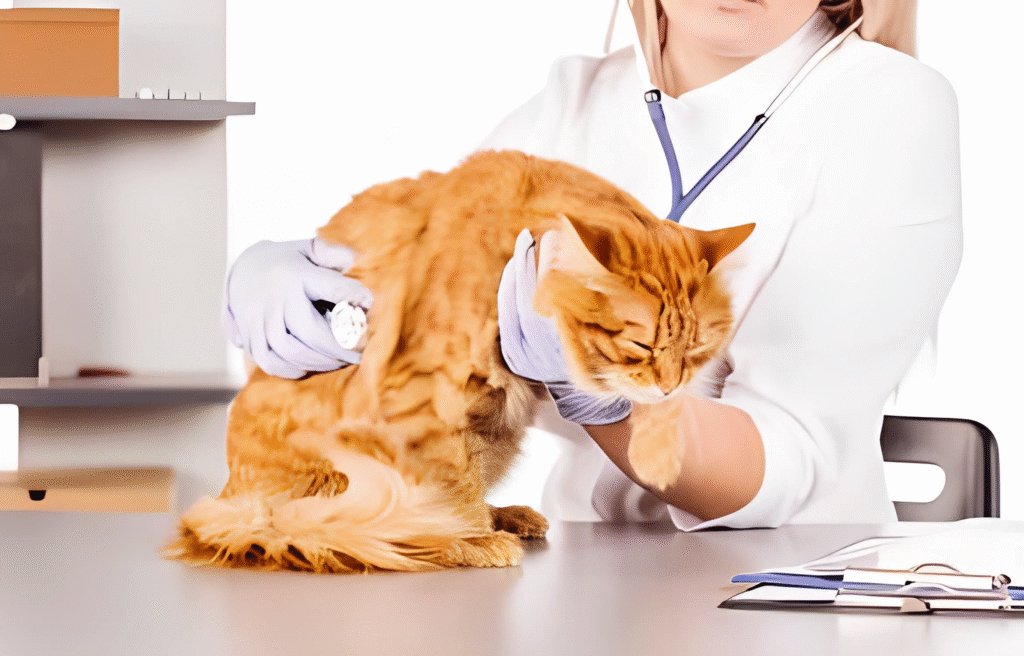What are seasonal allergies in cats? Everything You Need to Know.
As a pet parent, you may be asking if your fur babies suffer from the same health concerns as people do. One concern we frequently hear about is whether what are seasonal allergies in cats. The answer is yes, they can develop their own allergies that are triggered from environmental allergens such as pollen, dust particles and other allergens that thrive at certain times of the year. Understanding allergies and knowing your feline friend is safe, healthy, comfortable, and happy, will help keep your pet well cared for and out of the vet’s office.
In this guide, we will cover everything there is to know about seasonal allergies in cats, including what seasonal allergies in cats are, their symptoms, causes, diagnosis, treatment options, and how to help your feline friend thrive during allergy season. If you are a new cat parent or have been a pet parent for a while, I hope this guide will share some useful tidbits that will help you notice the signs early and get proper care for your pet with the vet.
What Are Seasonal Allergies in Cats?
What are seasonal allergies in cats? Yes. Seasonal allergies in cats are similar to that of a human’s seasonal allergies. Seasonal allergies in cats happen when they become flooded with specific seasonal environmental allergens (that are more prevalent at certain times) when their immune system overreacts. These times are typically spring, summer, and fall. Like people, cats can also develop an allergic response after repeated exposure to these triggers, over time. The immune system wrongly sees these harmless triggers as harmful and results in the familiar itching, sneezing, and allergic symptoms.
Not all cats will develop seasonal allergies but the chances will increase with age, especially after a certain age, in cats who have a genetic predisposition and/or have any underlying sensitivities. If you see your cat having allergy symptoms at certain times of the year, it is important to realize that they will certainly be in response to seasonal allergens.
How Do Seasonal Allergies in Cats Present?
Recognizing the symptoms of seasonal allergies in cats is important for a quick response to seasonal feline allergies.
- Itching and scratching: Allergic cats always try to scratch all around their face, ears, neck and paws.
- Sneezing: Frequent sneezing, sometimes producing clear mucus.
- Runny or watery eyes: Eruption of visible irritation causing discharge and redness.
- Head and face rubbing: rubbing their head and face on furniture or walls or another source of friction, including your hand, to alleviate irritation.
- Hair loss or irritation of skin: Prolonged scratching creates loosened hair, redness, swollen skin or sores.
- Respiratory signs: coughing, wheezing, or significant difficulty breathing if the allergic response is very bad.
- Licking or chewing: Cats may lick their paws or chew on their skin to relieve the irritation.
- Ear infections: Inflammation or discharge from the ears also indicates allergies. If your cat’s signs all primarily occur during a certain season or change in environment, then there is more possibility you may receive a diagnosis of seasonal allergies. However, some of the signs may overlap with other health conditions. Therefore, a veterinary consultation is very important for advised to make an correct diagnosis.

Common Causes of Seasonal Allergies in Cats
Finding out what your cat is allergic to can help manage the allergies and prevent exposures in the future. Here are the most common environmental factors responsible for seasonal allergies:
- Pollen
Pollen counts are at their highest during the spring and summer months which contributes to more allergy symptoms in sensitive cats.
- Mold Spores
Usually found in damp areas, mold potentially grows throughout the year, but also grows when it is wet or decaying organic matter is present. Mold spores can be present indoors and outdoors, creating an allergic reaction.
- Dust
Dust, which includes dust mites, can contribute to allergies indoors even when the pollen levels outside and seasonal factors are low. Dust mites are tiny creatures that live in bedding, carpets, and upholstery and are a common allergen.
- Environmental changes
Changes in weather, humidity, and air quality could also impact the levels of allergens and therefore a cat’s level of allergies.
- Particular plants and flowers
Some plants and flowers that you’re using in landscaping, or using as house plants may contain allergens that could affect cats that are sensitive to them.
Diagnosing Seasonal Allergies in Cats
A diagnosis is very important to effectively managing your cat’s allergy symptoms.
Physical Examination
A thorough physical examination could reveal skin irritation, ear infections, or the other symptoms of allergies.
Skin Tests
With internal skin testing, a veterinarian will inject small amounts of allergens into your cat’s skin to check for a reaction.
Blood Tests
Serum allergy tests measure the degree of allergen-specific antibodies.
Ruling out other health problems
Allergens can be similar to other health conditions (infections, parasites, or auto-immune disease, for example), so your vet may proceed with tests and cultures to rule out these additional issues.
Treatment for Seasonal Allergies in Cats
Managing your cat’s seasonal allergies usually includes some degree of environmental control with drugs and ongoing treatment, here is what to consider:
- Environmental management
- Minimize your cat’s exposure to allergens, flower shows, weather forecast, pollen count, time of day, grass cutting, cutting hedges, window/door closed in pollen season, air purifiers, do not house cat outside during predicted pollen count.
- Clean regularly, vacuum, dust, and bathe, cleaning regularly will lower the allergen load, both house and in your cat.
- Allergen free zones! You could choose rooms for your cat to escape, while owners can un-fold rooms for periods time if your cats’ allergy is serious enough.
- Medications
- Antihistamines: Benadryl (diphenhydramine) or Chlorpheniramine could help to cure.
- Corticosteroids: This class of medication is potent anti-inflammatory drugs sometimes prescribed in severe cases, often for short periods, given the potential side effects.
- Allergy Shots (Immunotherapy):Administrating small doses of allergen subcutaneously every month, or less often, outright desensitizes your cat’s immune system and reduces the allergic reaction over time.
Eye and Nasal Drops: The veterinarian may prescribe doses of drops to reduce nasal discharge and irritation.
- Topical and Dietary Therapies
- Medicated Shampoos and Sprays: Medicated shampoos and sprays work to soothe irritated skin and reduce allergen contact.
- Omega-3 Fatty Acids: Omega-3 supplements may help benefit skin quality and reduce inflammation.
- Specialized Diets: If your cat has food allergies in addition to seasonal allergies, an elimination diet may be warranted.
- Parasite Control
It is important to maintain a regular flea control treatment to avoid flea allergy dermatitis which can contribute to an exacerbation of seasonal allergies.
- Sharing with Your Veterinarian
It is always best to consult your veterinarian before starting any medications or treatment plans.

Preventative Measures and Suggestions for Pet Owners
Taking steps to prevent your cat from being exposed to allergens can go a long way towards reducing the impact of allergies. There are many things you can do.
- Always check the pollen levels. You can check the pollen levels in your community through weather apps or websites.
- Limit the outdoor activity. Allowing your cat to roam freely in the outdoors when pollen levels are high can significantly increase their ingestion of allergens.
- Groom your cat regularly. Regular bathing with hypoallergenic feline-friendly shampoo you should eventually be able to remove surface allergens.
Pest Control: You should provide veterinarian-recommended flea preventatives all year.
Monitor Symptoms: Keeping track of what your cat is experiencing over time can help you determine if there are trends, in which you can report to your veterinarian.
When to seek medical attention
While there are mild allergy symptoms you can manage without medical attention at home, you should seek veterinarian assistance if your cat;
- Has continued or worsening symptoms,
- Has increased or extreme difficulty breathing (wheezing),
- Has severe skin infections and/or sores,
- Has behavioral changes that indicate discomfort,
- Is lethargic or losing weight and/or appetite,
Prompt treatment from your veterinarian means your cat will have effective treatment and relief from allergies sooner.
Long-Term Perspective and Living with Seasonal Allergies
Seasonal allergies can be frustrating, but most cats can live with them successfully. Simple management by using environmental control, taking medications in a timely manner, combining with check-ups from your veterinarian can make seasonal part of a stress-free experience for everyone involved.
Also remember, some cats have multiple allergies (multiple seasonal and non-seasonal) which, may create a more comprehensive plan than seasonal plans alone.
Conclusion
what are seasonal allergies in cats.? Definitely, Similar to people, some cats can have sensitivities to environmental allergens, with some being seasonal. By creating a conducive environment, using proper medications, and providing appropriate health care, you can help assist your kitty in being as comfortable as possible throughout every season. Remember, if your kitty exhibits any allergies, early intervention is key to being comfortable and preventing complications.




